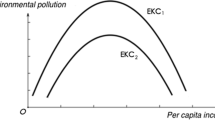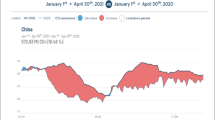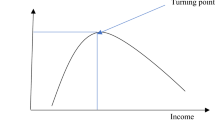Abstract
China, United States, India, Russia, and Japan are regarded as the top five carbon dioxide-emitting nations in the world. These countries altogether account for more than half of the global annual discharges of carbon dioxide. Consequently, impeding the carbon emission-led environmental adversities in these countries is of critical emphasis for establishing environmental sustainability worldwide. In this regard, this study checks how economic progress, energy use intensification, and renewable energy use affect the annual growth rates of per capita carbon dioxide emission in these highly-polluted economies considering the study period from 1990 to 2021. Besides, for analytical purposes, advanced panel data estimation techniques have been utilized for detecting and neutralizing the impacts of cross-sectional dependency and slope heterogeneity-related problems in the data. Overall, the findings endorse that economic progress deteriorates environmental quality both in the short and long run. However, since the long-run unfavorable environmental impacts of economic growth are relatively lower compared with the short-run impacts, the environmental Kuznets curve hypothesis can be deemed valid. Besides, more intensive use of energy resources is witnessed to impose negative long-run environmental consequences while the adoption of renewable energy instead of fossil fuels is found to improve environmental well-being, both in the short and long run. Furthermore, the results affirm that economic progress and energy use intensification jointly degrade environmental conditions. By contrast, economic progress alongside greater adoption of renewable energy is observed to inflict an environmental quality-improving effect. Considering these findings, a couple of carbon dioxide mitigating policies are suggested to the concerned highly polluted developed and developing nations.

Source: World Bank (2023)
Similar content being viewed by others
Data availability
Data sources are mentioned in the text.
Abbreviations
- CO2 :
-
Carbon dioxide
- COP27:
-
27th Conference of Parties
- CRSADF:
-
Cross-sectionally adjusted Augmented Dickey-Fuller
- CRS-ARDL:
-
Cross-sectional autoregressive distributed lag
- CRSD:
-
Cross-sectional dependency
- CRSIPS:
-
Cross-sectionally adjusted Im–Pesaran–Shin
- EKCH:
-
Environmental Kuznets Curve hypothesis
- GDP:
-
Gross domestic product
- PMG-ARDL:
-
Pooled mean group-autoregressive distributed lag
- PPP:
-
Purchasing power parity
- SLHET:
-
Slope heterogeneity
- UNSDG:
-
United Nations Sustainable Development Goals
References
Abban OJ, Xing YH, Nuţă AC, Nuţă FM, Borah PS, Ofori C, Jing YJ (2023) Policies for carbon-zero targets: Examining the spillover effects of renewable energy and patent applications on environmental quality in Europe. Energy Econ 106954. https://doi.org/10.1016/j.eneco.2023.106954
Abbasi KR, Awan A, Bandyopadhyay A, Rej S, Banday TP (2023) Investigating the inverted N-shape EKC in the presence of renewable and nuclear energy in a global sample. Clean Technol Environ Policy 25(4):1179–1194
Adebayo TS, Kirikkaleli D (2021) Impact of renewable energy consumption, globalization, and technological innovation on environmental degradation in Japan: application of wavelet tools. Environ Dev Sustain 23(11):16057–16082
Adebayo TS, Awosusi AA, Oladipupo SD, Agyekum EB, Jayakumar A, Kumar NM (2021) Dominance of fossil fuels in Japan’s national energy mix and implications for environmental sustainability. Int J Environ Res Public Health 18(14):7347
Adebayo TS, Samour A, Alola AA, Abbas S, Ağa M (2023) The potency of natural resources and trade globalisation in the ecological sustainability target for the BRICS economies. Heliyon 9(5):e15734. https://doi.org/10.1016/j.heliyon.2023.e15734
Agozie DQ, Gyamfi BA, Bekun FV, Ozturk I, Taha A (2022) Environmental Kuznets curve hypothesis from lens of economic complexity index for BRICS: evidence from second generation panel analysis. Sustain Energy Technol Assess 53:102597
Ahmad M, Satrovic E (2023) How do transportation-based environmental taxation and globalization contribute to ecological sustainability? Eco Inform 74:102009
Akadiri SS, Adebayo TS (2022) Asymmetric nexus among financial globalization, non-renewable energy, renewable energy use, economic growth, and carbon emissions: impact on environmental sustainability targets in India. Environ Sci Pollut Res 29(11):16311–16323
Alam MS (2022) Is trade, energy consumption and economic growth threat to environmental quality in Bahrain–evidence from VECM and ARDL bound test approach. Int J Emergency Services 11(3):396–408. https://doi.org/10.1108/IJES-12-2021-0084
Alola AA, Ozturk I (2021) Mirroring risk to investment within the EKC hypothesis in the United States. J Environ Manag 293:112890
Aydin M, Bozatli O (2023) The impacts of the refugee population, renewable energy consumption, carbon emissions, and economic growth on health expenditure in Turkey: new evidence from Fourier-based analyses. Environ Sci Pollut Res 30(14):41286–41298
Azam M, Uddin I, Khan S, Tariq M (2022) Are globalization, urbanization, and energy consumption cause carbon emissions in SAARC region? New evidence from CS-ARDL approach. Environ Sci Pollut Res 29(58):87746–87763
Caglar AE, Guloglu B, Gedikli A (2022) Moving towards sustainable environmental development for BRICS: investigating the asymmetric effect of natural resources on CO2. Sust Dev 30(5):1313–1325
Chudik A, Mohaddes K, Pesaran MH, Raissi M (2016) Long-run effects in large heterogeneous panel data models with cross-sectionally correlated errors. In Essays in Honor of man Ullah. Emerald Group Publishing Limited. pp. 85–135. https://doi.org/10.1108/S0731-905320160000036013
Dai J, Ahmed Z, Sinha A, Pata UK, Alvarado R (2023) Sustainable green electricity, technological innovation, and ecological footprint: does democratic accountability moderate the nexus? Util Policy 82:101541
Danish, Ulucak R, Khan SUD (2020) Relationship between energy intensity and CO2 emissions: does economic policy matter? Sustain Dev 28(5):1457–1464
Danish, Ozcan B, Ulucak R (2021) An empirical investigation of nuclear energy consumption and carbon dioxide (CO2) emission in India: bridging IPAT and EKC hypotheses. Nucl Eng Technol 53(6):2056–2065
Dogan E, Turkekul B (2016) CO 2 emissions, real output, energy consumption, trade, urbanization and financial development: testing the EKC hypothesis for the USA. Environ Sci Pollut Res 23:1203–1213
Dumitrescu EI, Hurlin C (2012) Testing for Granger non-causality in heterogeneous panels. Econ Model 29(4):1450–1460
Ehigiamusoe KU, Dogan E (2022) The role of interaction effect between renewable energy consumption and real income in carbon emissions: evidence from low-income countries. Renew Sustain Energy Rev 154:111883
Gao J, Murshed M, Ghardallou W, Siddik AB, Ali H, Khudoykulov K (2023) Juxtaposing the environmental consequences of different environment-related technological innovations: the significance of establishing good democratic governance. Gondwana Res. https://doi.org/10.1016/j.gr.2023.05.017
Ge M, Kannaiah D, Li J, Khan N, Shabbir MS, Bilal K, Tabash MI (2022) Does foreign private investment affect the clean industrial environment? Nexus among foreign private investment, CO2 emissions, energy consumption, trade openness, and sustainable economic growth. Environ Sci Pollut Res 29(18):26182–26189
Grossman G, Krueger A (1992) Environmental Impacts of a North American Free Trade Agreement (No. 644). CEPR Discussion Papers. Available at https://cepr.org/publications/dp644
Hamid I, Uddin MA, Hawaldar IT, Alam MS, Joshi DP, Jena PK (2023) Do better institutional arrangements lead to environmental sustainability: evidence from India. Sustain 15(3):2237. https://doi.org/10.3390/su15032237
Huang Y, Kuldasheva Z, Bobojanov S, Djalilov B, Salahodjaev R, Abbas S (2023) Exploring the links between fossil fuel energy consumption, industrial value-added, and carbon emissions in G20 countries. Environ Sci Pollut Res 30(4):10854–10866
Ibrahim RL, Adebayo TS, Awosusi AA, Ajide KB, Adewuyi AO, Bolarinwa FO (2022) Investigating the asymmetric effects of renewable energy-carbon neutrality nexus: can technological innovation, trade openness, and transport services deliver the target for Germany? Energy Environ. https://doi.org/10.1177/0958305X221127020
Idris FM, Seraj M, Özdeşer H (2023) Renewable energy consumption, CO2 emissions and trade balance nexus in OECD countries: evidence from ARDL bounds approach. Int J Energy Sect Manag 17(4):645–660
Iqbal M, Chand S, Ul Haq Z (2023) Economic policy uncertainty and CO2 emissions: a comparative analysis of developed and developing nations. Environ Sci Pollut Res 30(6):15034–15043
Islam MS, Rahaman SH (2023) The asymmetric effect of ICT on CO2 emissions in the context of an EKC framework in GCC countries: the role of energy consumption, energy intensity, trade, and financial development. Environ Sci Pollut Res 30(31):77729–77741
Ito K (2021) The relationship between CO2 emissions and income: evidence from Japan. Lett Spat Resour Sci 14:261–267
Itoo HH, Ali N (2023) Analyzing the causal nexus between CO2 emissions and its determinants in India: Evidences from ARDL and EKC approach. Manag Environ Qual: An Int J 34(1):192–213
Jahanger A, Ozturk I, Onwe JC, Joseph TE, Hossain MR (2023) Do technology and renewable energy contribute to energy efficiency and carbon neutrality? Evidence from top ten manufacturing countries. Sustain Energy Technol Assess 56:103084
Khan Y, Liu F (2023) Consumption of energy from conventional sources a challenge to the green environment: evaluating the role of energy imports, and energy intensity in Australia. Environ Sci Pollut Res 30(9):22712–22727
Khan U, Khan AM, Khan MS, Ahmed P, Haque A, Parvin RA (2023) Are the impacts of renewable energy use on load capacity factors homogeneous for developed and developing nations? Evidence from the G7 and E7 nations. Environ Sci Pollut Res 30(9):24629–24640
Kirikkaleli D, Güngör H, Adebayo TS (2022) Consumption-based carbon emissions, renewable energy consumption, financial development and economic growth in Chile. Bus Strateg Environ 31(3):1123–1137
Li C, Razzaq A, Ozturk I, Sharif A (2023) Natural resources, financial technologies, and digitalization: the role of institutional quality and human capital in selected OECD economies. Resour Policy 81:103362
Liu Y, Ali A, Chen Y, She X (2023) The effect of transport infrastructure (road, rail, and air) investments on economic growth and environmental pollution and testing the validity of EKC in China, India, Japan, and Russia. Environ Sci Pollut Res 30(12):32585–32599
Mehmood U (2022) Renewable energy and foreign direct investment: does the governance matter for CO2 emissions? Application of CS-ARDL. Environ Sci Pollut Res 29(13):19816–19822
Mirza FM, Sinha A, Khan JR, Kalugina OA, Zafar MW (2022) Impact of energy efficiency on CO2 emissions: empirical evidence from developing countries. Gondwana Res 106:64–77
Murshed M, Nurmakhanova M, Al-Tal R, Mahmood H, Elheddad M, Ahmed R (2022) Can intra-regional trade, renewable energy use, foreign direct investments, and economic growth mitigate ecological footprints in South Asia? Energy Sources Part B 17(1):2038730
Naminse YE, Zhuang J (2018) Economic growth, energy intensity, and carbon dioxide emissions in China. Pol J Environ Stud 27(5):2193–2201. https://doi.org/10.15244/pjoes/78619
Ozturk I, Al-Mulali U, Solarin SA (2019) The control of corruption and energy efficiency relationship: an empirical note. Environ Sci Pollut Res 26:17277–17283
Pan B, Adebayo TS, Ibrahim RL, Al-Faryan MAS (2022) Does nuclear energy consumption mitigate carbon emissions in leading countries by nuclear power consumption? Evidence from quantile causality approach. Energy Environ. https://doi.org/10.1177/0958305X221112910
Pata UK (2021) Renewable and non-renewable energy consumption, economic complexity, CO 2 emissions, and ecological footprint in the USA: testing the EKC hypothesis with a structural break. Environ Sci Pollut Res 28:846–861
Pata UK, Caglar AE (2021) Investigating the EKC hypothesis with renewable energy consumption, human capital, globalization and trade openness for China: evidence from augmented ARDL approach with a structural break. Energy 216:119220
Pesaran MH (2007) A simple panel unit root test in the presence of cross-section dependence. J Appl Economet 22(2):265–312
Pesaran MH (2021) General diagnostic tests for cross-sectional dependence in panels. Empir Econ 60(1):13–50
Pesaran MH, Yamagata T (2008) Testing slope homogeneity in large panels. J Econom 142(1):50–93
Rehman A, Ma H, Ozturk I, Radulescu M (2022) Revealing the dynamic effects of fossil fuel energy, nuclear energy, renewable energy, and carbon emissions on Pakistan’s economic growth. Environ Sci Pollut Res 29(32):48784–48794
Saqib N, Ozturk I, Usman M, Sharif A, Razzaq A (2023) Pollution haven or halo? How European countries leverage FDI, energy, and human capital to alleviate their ecological footprint. Gondwana Res 116:136–148
Shan S, Ahmad M, Tan Z, Adebayo TS, Li RYM, Kirikkaleli D (2021) The role of energy prices and non-linear fiscal decentralization in limiting carbon emissions: tracking environmental sustainability. Energy 234:121243
Sinha A, Shahbaz M (2018) Estimation of environmental Kuznets curve for CO2 emission: role of renewable energy generation in India. Renew Energy 119:703–711
Sinha A, Sengupta T, Alvarado R (2020) Interplay between technological innovation and environmental quality: formulating the SDG policies for next 11 economies. J Clean Prod 242:118549
Usman A, Ozturk I, Naqvi SMMA, Zafar SM, Javed MI (2023) Green versus conventional growth in the EKC framework of top pollutant footprint countries: evidence based on advanced panel data techniques. Geol J. https://doi.org/10.1002/gj.4822
Verbič M, Satrovic E, Mujtaba A (2022) Assessing the driving factors of carbon dioxide and total greenhouse gas emissions to maintain environmental sustainability in Southeastern Europe. Int J Environ Res 16(6):105
Wang Z, Pham TLH, Sun K, Wang B, Bui Q, Hashemizadeh A (2022) The moderating role of financial development in the renewable energy consumption-CO2 emissions linkage: the case study of Next-11 countries. Energy 254:124386
Wang W, Ali A, Wang H, Feng Y, Dai S (2023) EKC hypothesis testing and environmental impacts of transportation infrastructure investments in China, Turkey, India, and Japan. Environ Sci Pollut Res. https://doi.org/10.1007/s11356-023-27580-3
Westerlund J (2007) Testing for error correction in panel data. Oxford Bull Econ Stat 69(6):709–748
World Bank (2023) World development indicators. The World Bank. Available at: https://databank.worldbank.org/source/worlddevelopment-indicators. Accessed on 5.5.2023
Wu L, Adebayo TS, Yue XG, Umut A (2023) The role of renewable energy consumption and financial development in environmental sustainability: implications for the Nordic Countries. Int J Sust Dev World 30(1):21–36
Xu Y, Umar M, Kirikkaleli D, Adebayo TS, Altuntaş M (2022) Carbon neutrality target in Turkey: measuring the impact of technological innovation and structural change. Gondwana Res 109:429–441
Xue C, Shahbaz M, Ahmed Z, Ahmad M, Sinha A (2022) Clean energy consumption, economic growth, and environmental sustainability: what is the role of economic policy uncertainty? Renew Energy 184:899–907
Yang X, Lou F, Sun M, Wang R, Wang Y (2017) Study of the relationship between greenhouse gas emissions and the economic growth of Russia based on the Environmental Kuznets Curve. Appl Energy 193:162–173
Zeraibi A, Ahmed Z, Shehzad K, Murshed M, Nathaniel SP, Mahmood H (2022) Revisiting the EKC hypothesis by assessing the complementarities between fiscal, monetary, and environmental development policies in China. Environ Sci Pollut Res 29(16):23545–23560. https://doi.org/10.1007/s11356-021-17288-7
Funding
This study is supported via funding from Prince Sattam bin Abdulaziz University project number PSAU/2023/R/1444.
Author information
Authors and Affiliations
Contributions
AKMAR, JCG, and MM conceptualized, wrote the original draft, wrote the revised draft, and conducted the analysis. HM compiled the literature review and generated the graphical illustrations, and reviewed and edited the final draft. DB supervised, compiled data, and wrote the original draft. MEH compiled the literature review, conducted the econometric analysis, and contributed to the methodology section.
Corresponding author
Ethics declarations
Ethics approval
This is not applicable.
Consent to participate
This is not applicable.
Consent for publication
This is not applicable.
Competing interests
The author declares no competing interests.
Additional information
Responsible Editor: Philippe Garrigues
Publisher's note
Springer Nature remains neutral with regard to jurisdictional claims in published maps and institutional affiliations.
Rights and permissions
Springer Nature or its licensor (e.g. a society or other partner) holds exclusive rights to this article under a publishing agreement with the author(s) or other rightsholder(s); author self-archiving of the accepted manuscript version of this article is solely governed by the terms of such publishing agreement and applicable law.
About this article
Cite this article
Rahman, A.K.M.A., Galiano, J.C., Murshed, M. et al. Reinvigorating the environmental Kuznets curve hypothesis in the context of highly polluted nations: evidence using advanced panel estimation techniques. Environ Sci Pollut Res 30, 103212–103224 (2023). https://doi.org/10.1007/s11356-023-29237-7
Received:
Accepted:
Published:
Issue Date:
DOI: https://doi.org/10.1007/s11356-023-29237-7




